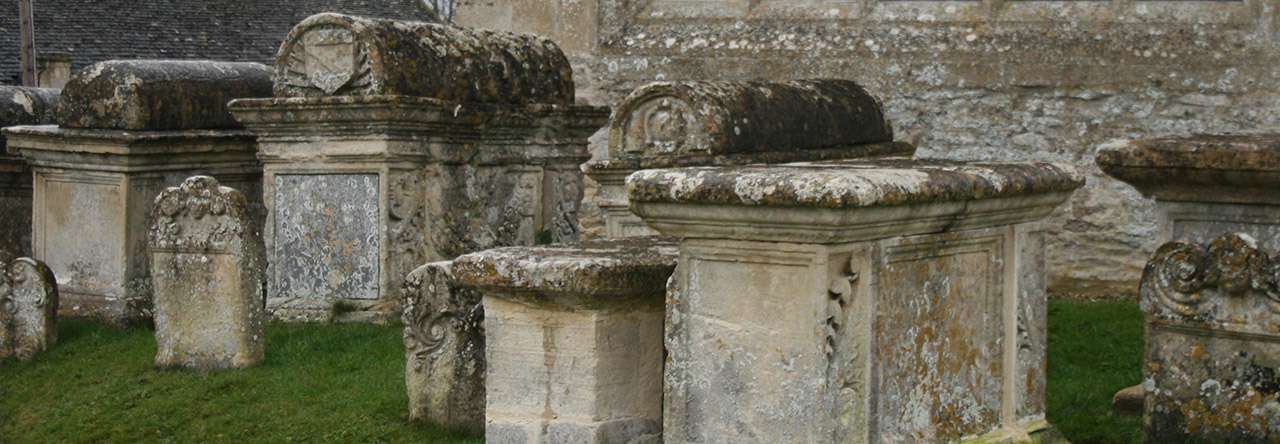Great Expectations was always my favourite Dickens, not least for its unrivalled ensemble of characters.
Biddy is surely Dickens’ most loveable female. Unlike his usual heroines who are either vapid, foolish creatures, simpering and affected, or wearyingly saintly and selfless, Biddy alone is credible and attractive. For Biddy is both good and clever. She may love Pip, but she is not deceived, being acutely aware of his weakness and vanity. And if her tone is never acerbic, her words are frequently pointed. She knows that he has no justification for patronising and condescending to her. She may be hurt by his carelessly cruel words, but she maintains her dignity, replying to his arrogant suggestion that despite not being a gentleman, “I should have been good enough for you; shouldn’t I Biddy?” with a disconcerting: “Yes, I am not over-particular.” She counters his vain and supercilious query, “How do you manage, Biddy, to learn everthing that I learn and always to keep up with me?” with a humour to which he is impervious, “I suppose I must catch it – like a cough.” The only time her response borders on the sharp is in defence of Joe when Pip asks her to, “help Joe on …with his learning and his manners. “Won’t his manners do then?” she flashes back at him with real and justified anger.
When she writes to Pip explaining that Joe wants to visit him in London, she reads the letter to Joe omitting with characteristic sensitivity the sentence where, clearly all to aware of the mean-spirited embarrassment with which Pip will greet this proposal, she has written, “I hope… it will be agreeable to see him even though a gentleman, for you had ever a good heart and he is a worthy man.”
Pip himself is a study in human weakness, his pride and snobbery fighting with his natural affection. He is ashamed of his home at the forge; he dreads the appearance of Joe, “coarse and ignorant,” before Miss Haversham and Estella; he finds Biddy “common.” His resentment flares when, in response to his own condescending assurance, Joe too readily agrees that he is sure he will never forget him. When Joe and Biddy express wonder at the notion of his being a gentleman he is angry and bitter.
His impatience and embarrassed contempt surface when Joe visits him in London, and make a sorry contrast with the quiet dignity with which the latter takes his leave. And the remorse which succeeds soon fades into spurious self-justifications for not staying at the forge when he next returns to visit Miss Haversham. When he finally returns for his sister’s funeral he is annoyed by Biddy’s silent reaction to his assertion that in future he will often visit Joe; she knows, of course, that he will not do so , but Pip takes her silence as an unkindness and injustice to himself.
His abhorrence and repugnance when he realises that Magwitch is his benefactor, his disgust at his uncouth manners and appearance is not attractive. Yet when the returned convict is hunted down and wounded Pip’s better self emerges and he sees “only a man who had meant to be my benefactor, and who had felt affectionately, gratefully, and generously, towards me with great constancy through a series of years. I only saw in him a much better man than I had been to Joe.” In the end he does not desert Magwitch.
Great Expectations also offers us one of the most delightful minor characters in Dickens: Trabb’s Boy, exuberant and irrepressible, thumbing his nose at pretension and mocking Pip’s insolence as, thinking himself above others, he makes a proud progress down the High Street in his new gentlemanly clothes. As Trabb’s boy impersonates him to the amusement of spectators it is impossible not to sympathise with Pip’s humiliation in the face of sustained mockery and ridicule.
In Satis House with its dark rooms and yellow light, we encounter the faded spectre of Miss Havisham, one of Dickens’ great grotesques, a ghastly waxwork amongst her cobwebs and rotted cake. Spinning her own evil web like one of the speckle-legged spiders with blotchy bodies that scurry in and out of the lump of black fungus which had been her wedding cake, she pursues her cruel manipulation of the young Estella and her vengeful torture of Pip.
And through the tragic life of Magwitch comes a severe indictment of a society which put men in irons and imprisoned them in hulks before transporting them, then condemned them to death if they returned however blameless, industrious, and honest their lives might have been in the intervening years.
As compelling as Dickens’ characters is his mesmerizing evocation of the marsh country where the young Pip lives at the forge. It is a “dark flat wilderness,” with a “ low leaden line beyond,” the river on which stands a gibbet hung with chains. A raw wind rushes from its “distant savage lair,” the sea. Here on a damp rimy morning, “ on every rail and gate wet lay clammy.” The dismal firing of the great guns on the hulks , the sound deadened by the thick mist, warned of an escaped convict.
In the bleak churchyard overgrown with nettles Pip traced out the letters on his parents’ tombstone and contemplated the “five little stone lozenges, each about a foot and a half long, which were arranged in a neat row beside their grave and were sacred to the memory of five little brothers of mine.” And here he encountered the terrifying Magwitch, the convict escaped from the hulks, with a great iron on his leg: “ A man who had been soaked in water, and smothered in mud, and lamed by stones, and cut by flints, and stung by nettles, and torn by briars; who limped and shivered, and glared and growled.” Magwitch turned the petrified Pip upside down in search of any food he might have in his pockets. “ When the church came to itself – for he was so sudden and so strong that he made it go head over heels before me…I was seated on a high tombstone trembling.”
Years after I first read the novel I went in search of the church of St. James in the village of Cooling on the North Kent marshes. Here, in a small churchyard which, like its environs, has been much tamed since Dickens’ day, are the little stone lozenges which inspired the description in that vivid opening chapter.
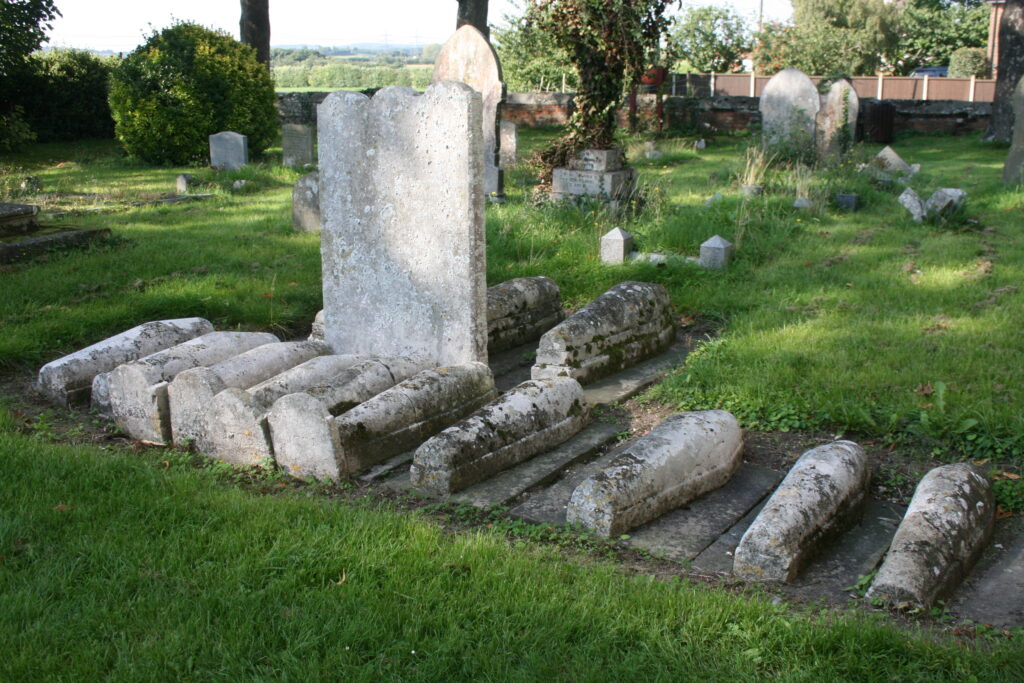
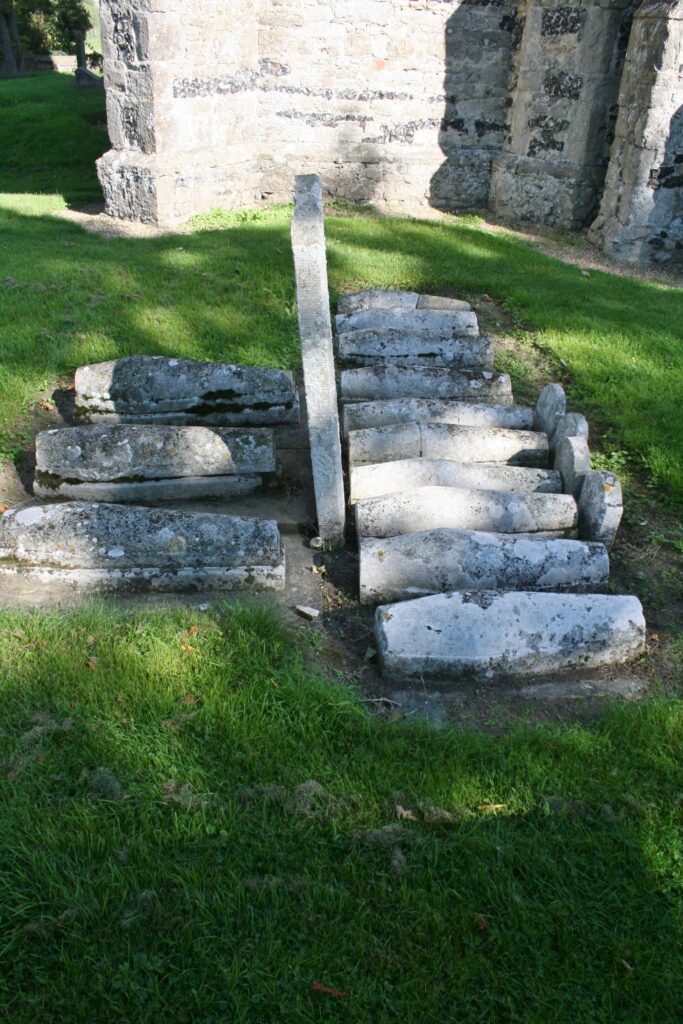
Nearby is a splendid chest tomb, surely the one on which Pip found himself seated and trembling.
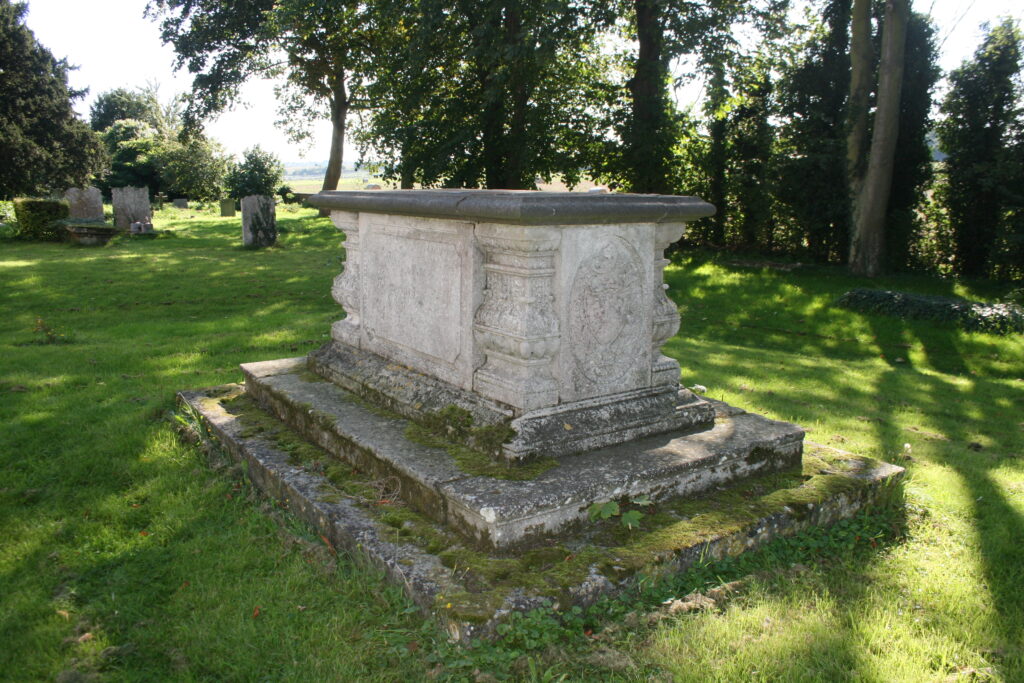
From the church I crossed the marshes to the river and another graveyard where, anchored in the mud, the skeletal wreck of a hulk lay rotting. I longed to believe that here were the warped remains of the ship from which Dickens drew inspiration, but regrettably I knew better. It is the Hans Egede, a barge built in the 1920s, and converted into a hulk for coal storage in the 1950s after it had caught fire. It was being moved up the Thames from the Medway when it began to take in water; it was beached and abandoned. Besides, even in Dickens’ day the hulks were moored on the Medway rather than on the Thames.
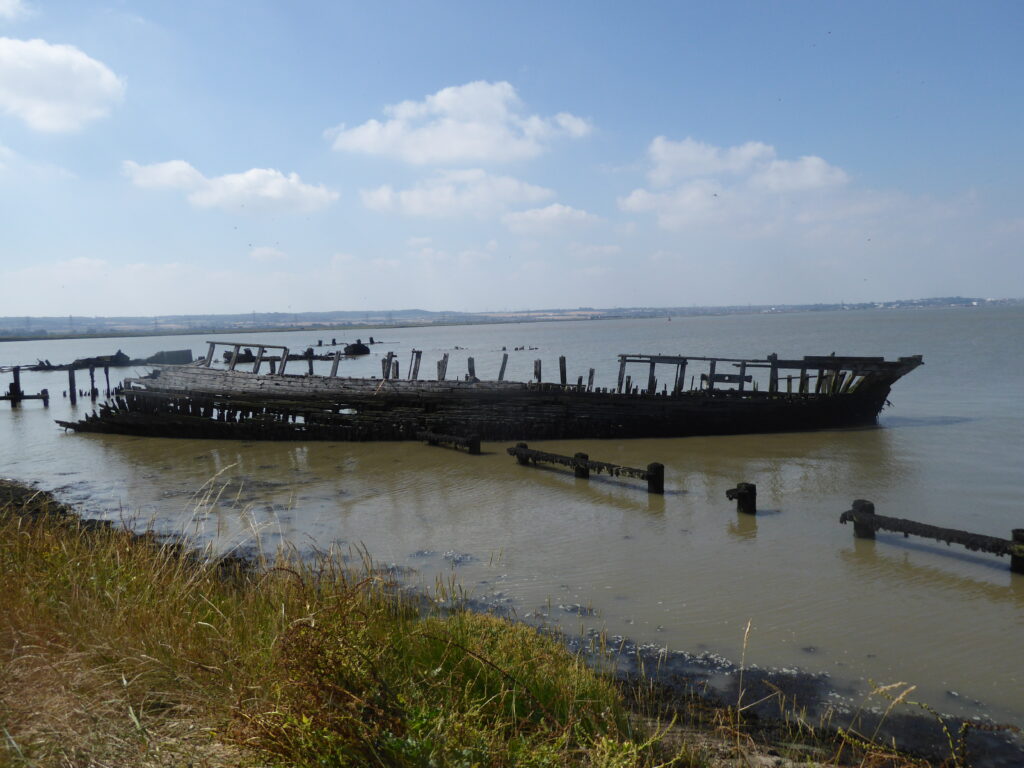
But in my imagination this was the hulk from which Magwitch escaped, and only because the day was so unnaturally bright and sunny was I unable to detect his ghostly form dragging his leg iron across the marshes towards the churchyard and a small boy who would provide him with vittles and a file.
